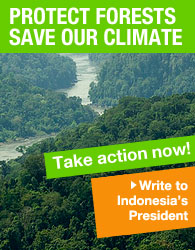
A river winds its way through a deforested area in the Lereh region of Papua, Indonesia
© Greenpeace/Rante
We finally set sail from Jayapura on Wednesday evening. Under a half moon, the Esperanza slid west along the coast of Papua, dark jagged mountains rising into the silvery haze to port and a tropical thunderstorm chasing our tail. Sailing through the night and yesterday morning, we anchored at lunchtime to conduct some research trips. Tweety the helicopter was allowed to stretch her rotors and fly over the nearby areas of forest to see what kind of deforestation is (or isn’t) happening. But more on that another time.
First though, I want to start building a picture of the players involved in the palm oil industry which threatens to engulf the forests of Papua, starting with the political powers. It’s no surprise that the Indonesian government is keen to increase palm oil production, even though the country already produces more than anywhere else in the world. The global rush towards biofuels is one reason, and last year the government signed a deal with various companies and investment banks to develop its biofuel industry in a big way.
To meet these political and economic targets, huge areas of forest elsewhere in Indonesia have been replaced by row upon row of oil palms – I saw plantations like these several years in Sumatra and they really do go on forever. And yet earlier this year, the agricultural minister made a startling statement, claiming that the palm oil industry could expand without encroaching on the forests. He’s right too, if you accept the government’s definition of what a forest is.
We think a forest is still worth preserving when there’s only 10 per cent of it left; below 10 per cent and we’d say it was degraded. For the official purposes of the Indonesian government, however, an area of forest is thought to be degraded if it has lost just ten per cent of its trees – or to put it another way, if 90 per cent is untouched. This is the kind of relatively undamaged forest the minister thinks is worth sacrificing for palm oil, because it’s into these ‘degraded’ areas he intends to push the industry.
It’s not all doom and gloom though. At a local level in both Papua and West Papua (which comprise the Indonesian half of New Guinea), there are some fierce forest defenders in high places. Papua’s Governor Suebu is standing up to distant Jakarta by insisting that if anyone is going to make money from the forests, then they need to be better managed so they aren’t exploited to destruction, and that local Papuans are treated fairly and with respect.
He’s also demanded that all existing logging permits in Papua (many of which will lead to palm oil plantations once the trees are removed) be revoked. Only the national government has the power to do that, but Suebu has taken some pretty solid action in banning the export of logs from his province.
The result is that logging has decreased dramatically. In 2005, 42 timber companies were operating in Papua; this year it’s down to just seven, and in one of the research trips our campaigner Bustar noticed the number of logging ponds (where logs are held so they can be collected by cargo ships) has decreased. No one is going to spend money on logging if there’s nowhere to sell the timber, and without the logging there’s nowhere for the plantations to go. However, Suebu can only do so much and logging does still continue – on the same trip, Bustar saw large cleared areas where he hadn’t expected to find them.

Despite Governor Suebu’s efforts to protect Papua’s forests, logging still continues © Greenpeace/Rante
Jakarta is, of course, putting huge pressure on Suebu to lift the export ban but so far he’s holding firm. But rather than leaning on provincial governors, the government would be better off figuring out how it’s going to slash emissions from deforestation by 50 per cent in the next year or so. There’s no indication of how they plan to do this, but something pretty drastic is needed.
Which is exactly why the Esperanza is here. We’re pushing for an immediate moratorium on deforestation in Indonesia to give everyone time to develop the best way to protect the forests permanently, including a financial mechanism which will make the trees more valuable where they are, instead of on a cargo ship. More on this as well in a very short while.




Leave a comment